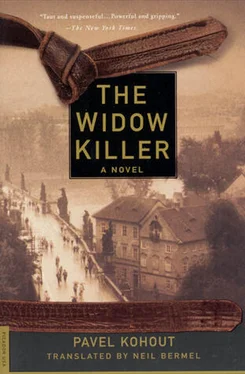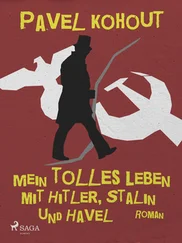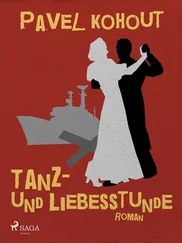“Hello,” the visitor then called out, “it’s me,  ebesta. Not a single man at the graveyard or on the way here.”
ebesta. Not a single man at the graveyard or on the way here.”
Jitka decided to set out right away for a second round and then again that afternoon.
“She’s right,” Grete said that evening. “In for a penny, in for a pound. I’m going at least twice tomorrow; we don’t leave for the Beneschau SS garrison until four.”
Before heading home to find her, Buback had had the newly arrived reports translated for him. Of course, he could read them far faster than the day’s interpreter could stammer through them, but he had a game to play and found that in any case he paid closer attention that way. The repeated message from the Klá  terec priest caught his eye as well. Had it been dealt with, he asked; yes, he heard, it had been passed back to their colleagues in Burglary and Robbery.
terec priest caught his eye as well. Had it been dealt with, he asked; yes, he heard, it had been passed back to their colleagues in Burglary and Robbery.
Sitting in the small wicker armchair by the bathtub, he told Grete about his day’s experiences. He realized with a shock that he was betraying official and military secrets with conveyer-belt speed to a woman he had known less than a month. Her daily ritual mesmerized him: Each evening, she rinsed off her exhaustion by holding the showerhead motionless with both hands just over her head, and the water ran down her body like a fountain pouring over a statue. He never ceased to wonder at the unbelievable femininity of her slender body, and later at the inexhaustible energy she could unleash as they made love.
She washed him clean of the stains the day left behind; she freed him from the horrible war and his work without enslaving him to new needs, the way he had feared at first. How can I fall for her so completely, and still feel so free? He did not understand, but soon he stopped thinking, period, and enthusiastically lost himself in her over and over, until it was the only thing that gave his life meaning.
Hunger regularly hit her after midnight, and he could not open the cans of military rations fast enough; mornings he would make her cocoa at the signal of her fluttering eyelids or, when he could not wait for her, he left it in a thermos. Gradually he took on other functions in her life, things he had never done when married: he kept her diary, picked up their grocery rations, and took care of the laundry. His reward was the childish pleasure of her whimpers as she slowly roused herself in the mornings.
“You’re the best, Buback, because you never wake me or pressure me…”
She made up for their lovemaking hours with a sleep that was strenuous in its intensity, while he thanked his age and military training for keeping him alert during the day. Today, however, after her midnight snack, she did not take him into her arms again.
“Let’s be good tonight,” she decided. “Tomorrow I want to be a widow that shark will sense from halfway across Prague!”
When a Werkschutzer ordered him to report immediately to the building director, he was rattled. Was it a TRAP? Would THEY be waiting for him? The fat man with a pistol under his paunch, however, showed no inclination to accompany him upstairs, and as he went up the service staircase his pulse surprisingly slowed. He was all the more devastated when Marek — as always, without even a greeting or an introduction — thrust a new task at him.
“The Luftschutz has decided to enlarge our shelter, in case there are more air raids on Plze  . See that it’s taken care of.”
. See that it’s taken care of.”
“Who’s it for? We’re not even open; there’s room for all the staff as is.”
The theater had been closed for two years now. The actors were weaving bast wrappings for grenades, the stagehands had been conscripted in the Totaleinsatz mobilization and only a half dozen rejects and cripples were left to ensure that the building did not leak, the pipes did not burst, and the sets and costumes were not eaten by moths before better times came. He was one of those who stayed, partly thanks to his old head wound, but also because he was skilled and extraordinarily intelligent for an ordinary laborer.
“They say there may be fighting in Plze  , so we need a public shelter for three hundred people. Get a team together and clear it out.”
, so we need a public shelter for three hundred people. Get a team together and clear it out.”
He could only think of one thing.
WHERE WILL I PUT MY SOULS?
“Can we leave at least a few lumps of ice down there? Once it gets warmer the beer’11 be swill.”
For a year now the theater canteen had been open to the public, partially offsetting the lack of ticket receipts. Pensioners especially were lured by the chance of getting some horsemeat stew alongside their still passable pilsner without needing to dig into their meager ration coupons. Marek dismissed the suggestion with a wave of his hand.
“I’ve tried that already, of course. They just said that starting Monday they’ll take ten thousand for each day we delay. And what’s more, they could imprison me for sabotage. So beer or no beer, take it out to the canal-side courtyard.”
Four days left until Monday. And he had no time tomorrow. TOMORROW MAKES A WEEK! An idea came to him in his hour of need.
“Easy as one, two, three! Before then I’ll try to visit a couple of pubs, see if someone’ll buy it from us. If not, we’ll do the job Sunday.”
By then THERE’lL BE A SIXTH ONE! And he’d have time to think where to put them. He willed Marek to nod.
“Fine, try it. But on Monday the cellar’d better be empty and clean as a whistle — it’s up to you, you hear?”
Without even a dismissal his boss bent back over his files.
Cheapskate, he thought on his way out. If only you knew! Still, he was grateful the man had unknowingly given him the opportunity to disappear the whole next day. He’d forget about buyers for the ice, take two slabs back to his own cellar, and secure his treasures for at least another two months.
He realized that the sixth one was still beating in some sinner’s breast, and broke out in an excited sweat at the thought:
THIS TIME TOMORROW IT WILL BE MINE!
What should he go as? He remembered the Werkschutzer.
But wasn’t it time to change cemeteries? Through the veil of years he saw HER showing him the graves of their national heroes. Someday you’ll lie here, my little Tony, respected by our whole nation…. Well, maybe ONE MORE TIME!
Slowly but surely Morava calmed down. Jitka had three shifts behind her already, as they’d had to note in their record book, during which she made the trip from Vy  ehrad to Kav
ehrad to Kav  í Hory seven times. Buback’s girlfriend had alternated with her; she’d played the bait (as she called it) four times all told.
í Hory seven times. Buback’s girlfriend had alternated with her; she’d played the bait (as she called it) four times all told.
Neither the women nor their guards had noticed even the slightest sign of interest. The men appearing at the cemetery were for the most part older widowers; many they recognized after a couple of days as regular visitors of their wives’ graves.
One day, a hale and hearty forty-year-old newcomer caused a commotion. He was so evidently interested in Jitka that all three watchers simultaneously latched onto him as he traipsed behind the girl at a dangerously short remove.  ebesta, who was in charge in an emergency, finally decided there was no danger of attack just yet if the perpetrator was after his usual goal.
ebesta, who was in charge in an emergency, finally decided there was no danger of attack just yet if the perpetrator was after his usual goal.
The man, who politely addressed Jitka after a short while, turned out to be a stonemason from Kolín near Prague who was looking for customers. He had noticed, he explained, that her grave lacked a fitting stone; he had a wide assortment at home and would give her a good price. He showed no interest in accompanying her back, but just to be sure they brought him in and, with Morava’s aid, presented the horrified man to the caretaker on the embankment. The old man was surprisingly sure that he had never seen the stonemason, and later the suspect produced airtight alibis for all the dates in question.
Читать дальше

 ebesta. Not a single man at the graveyard or on the way here.”
ebesta. Not a single man at the graveyard or on the way here.” terec priest caught his eye as well. Had it been dealt with, he asked; yes, he heard, it had been passed back to their colleagues in Burglary and Robbery.
terec priest caught his eye as well. Had it been dealt with, he asked; yes, he heard, it had been passed back to their colleagues in Burglary and Robbery. . See that it’s taken care of.”
. See that it’s taken care of.” í Hory seven times. Buback’s girlfriend had alternated with her; she’d played the bait (as she called it) four times all told.
í Hory seven times. Buback’s girlfriend had alternated with her; she’d played the bait (as she called it) four times all told.










